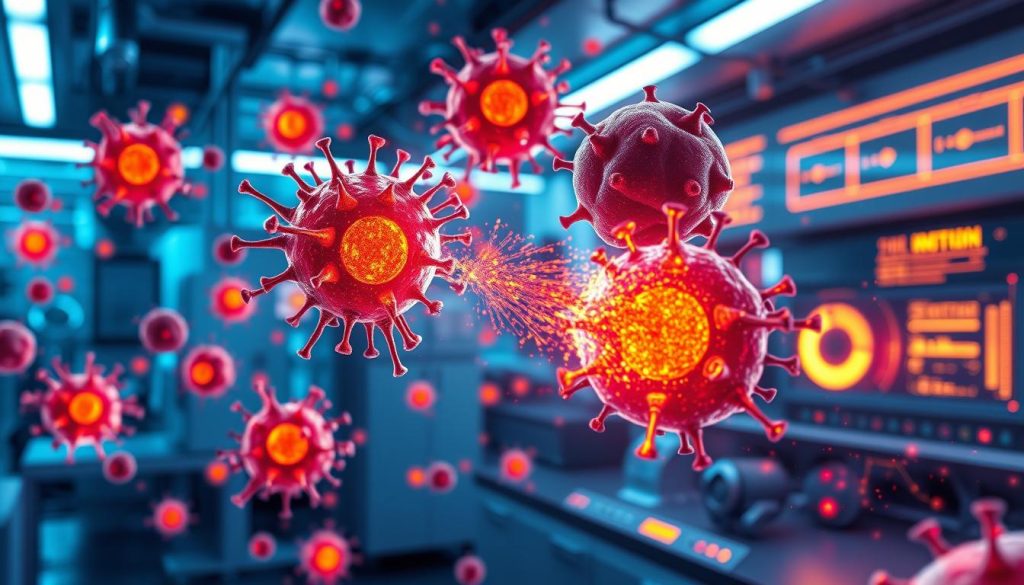Cancer immunotherapy has changed how we treat many cancers. Adoptive cell transfer using CAR T cells is a key part of this change. It has worked well for blood cancers, but solid tumors are harder to treat.
Using CAR T cells for solid tumors is very promising. But, the tumor environment is complex. This makes it hard for CAR T cells to work well.
In this article, we explore new ways to make CAR T cell therapy better for solid tumors. We look at how to make CAR T cells stronger and get them to reach tumors better. We also talk about targeting more than one cancer antigen. These advances could make CAR T cell therapy even more effective against solid tumors.
Introduction to CAR T Cell Therapy
Cancer immunotherapy has made big strides, giving hope to those fighting cancer. Chimeric antigen receptor (CAR) T cell therapy is a key part of this progress. It uses a patient’s immune system to fight cancer, making it a personalized medicine.
What is CAR T Cell Therapy?
CAR T cell therapy is a new way to treat cancer. It changes a patient’s T cells to find and kill cancer cells. This is done by adding a special receptor to the T cells.
To make CAR T cells, several steps are taken:
- Collecting a patient’s T cells through a procedure called leukapheresis
- Genetically modifying the T cells in a laboratory to express the chimeric antigen receptor
- Expanding the modified T cells to obtain a sufficient number for treatment
- Infusing the CAR T cells back into the patient’s bloodstream
How Does CAR T Cell Therapy Work?
After being infused, CAR T cells multiply and find cancer cells. They bind to the cancer cells and activate. This leads to the cancer cells being destroyed.
The table below explains the parts of a CAR T cell and what they do:
| Component | Function |
|---|---|
| Antigen-binding domain | Recognizes and binds to the targeted antigen on cancer cells |
| Transmembrane domain | Anchors the CAR to the T cell membrane |
| Costimulatory domain | Enhances T cell activation and persistence |
| CD3ζ signaling domain | Triggers T cell activation and cytotoxic activity |
CAR T cells can keep fighting cancer for a long time. This is why they are so effective against some blood cancers. They keep attacking cancer cells.
Scientists are working to use CAR T cells for solid tumors too. They want to make it work for more types of cancer. They are trying to make the therapy better and more effective.
Challenges in Treating Solid Tumors with CAR T Cells
CAR T cell therapy has shown great success in fighting blood cancers. But, it faces big challenges when trying to treat solid tumors. The tumor environment and the nature of solid tumors make it hard to use CAR T cells effectively.
Tumor Heterogeneity and Antigen Escape
One big problem is that solid tumors have many different antigens. This makes it tough to find a single target for CAR T cells. Also, some tumor cells can stop showing the antigen, making treatment less effective.
Immunosuppressive Tumor Microenvironment
The environment around solid tumors is very bad for the immune system. It has immune cells that stop the immune system from working well. It also has substances that block the immune system. Here are some of these factors:
| Immunosuppressive Factor | Mechanism of Action |
|---|---|
| Regulatory T cells (Tregs) | Suppress T cell activation and proliferation |
| Myeloid-derived suppressor cells (MDSCs) | Inhibit T cell function and promote tumor growth |
| Inhibitory cytokines (e.g., TGF-β, IL-10) | Downregulate T cell responses and promote immunosuppression |
| Checkpoint molecules (e.g., PD-L1, CTLA-4) | Engage inhibitory receptors on T cells, leading to T cell exhaustion |
Limited T Cell Trafficking and Infiltration
Another big challenge is getting T cells to reach the tumor. The tumor’s structure and lack of signals make it hard for T cells to get in. This limits how well CAR T cells can fight the tumor.
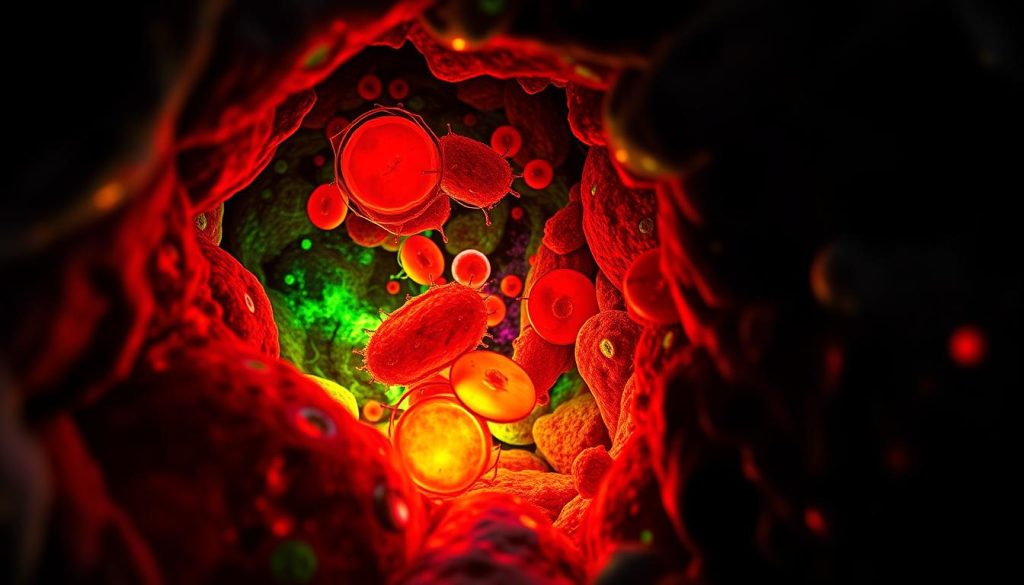
The immunosuppressive nature of the tumor microenvironment and the limited T cell infiltration are two of the most significant hurdles we face in developing effective CAR T cell therapies for solid tumors. Overcoming these challenges will require innovative strategies and a deeper understanding of the complex interactions between the tumor and the immune system.
Strategies to Enhance CAR T Cell Efficacy in Solid Tumors
CAR T cell therapy has shown great success in fighting blood cancers. But, it faces big challenges when treating solid tumors. Scientists are working hard to find new ways to make CAR T cells work better in solid tumors.
One idea is to make CAR T cells target more than one antigen at a time. This helps avoid the problem of the tumor changing its antigen. Dual-targeted CAR T cells have two different parts that can bind to different antigens.
Another strategy is to give CAR T cells extra tools to fight the tumor’s defenses. Armored CAR T cells can release pro-inflammatory cytokines or carry checkpoint inhibitors. This helps T cells stay strong and keep fighting in the tough tumor environment.
Getting T cells into solid tumors is also key. Scientists are looking into CAR T cells that can find their way into tumors better. They’re also exploring combination therapies to help T cells get into the tumor more easily.
“The development of innovative strategies to enhance CAR T cell efficacy in solid tumors is a rapidly evolving field, with the potential to revolutionize cancer treatment.
As research moves forward, new technologies and a better understanding of tumors will help create better CAR T cell treatments. These treatments will be more effective and tailored to each patient’s needs.
Targeting Multiple Antigens with CAR T Cells
One promising strategy to enhance the efficacy of CAR T cell therapy in solid tumors is to target multiple antigens simultaneously. This approach aims to address the challenges posed by tumor heterogeneity and antigen escape. By targeting multiple tumor-associated antigens, CAR T cells can potentially recognize and eliminate a broader range of cancer cells.
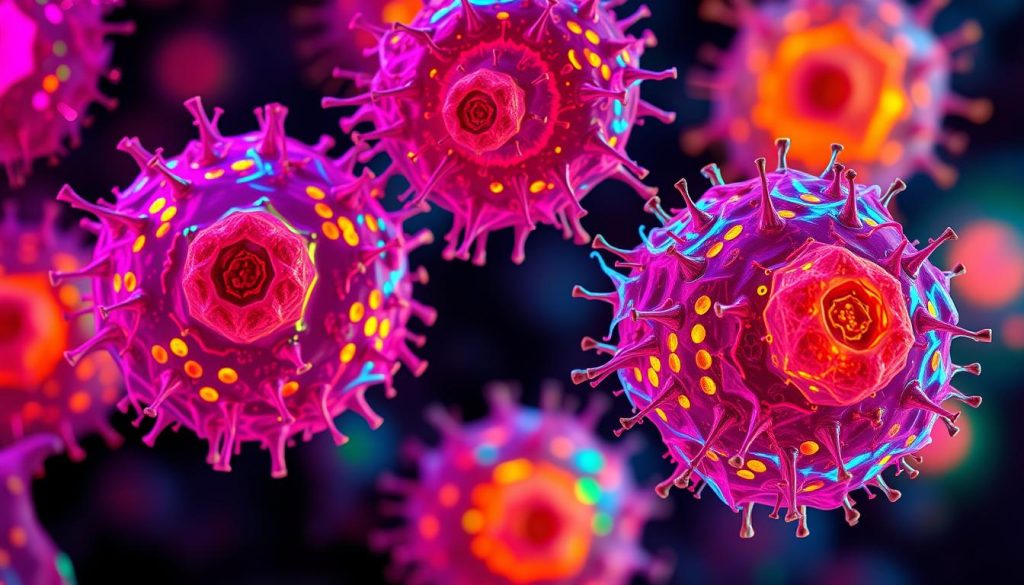
Researchers are exploring various multi-antigen targeting approaches, including dual-targeted CAR T cells and tandem CAR T cells. These innovative designs allow CAR T cells to recognize and respond to multiple tumor antigens. Recent developments in CAR T cell therapy for solid have shown promising results in preclinical studies and early clinical trials.
Dual-Targeted CAR T Cells
Dual-targeted CAR T cells are engineered to express two distinct antigen-binding domains. Each targets a different tumor-associated antigen. This design enables the CAR T cells to recognize and engage with cancer cells that express either or both of the targeted antigens. Dual-targeted CAR T cells have shown improved efficacy and reduced off-target toxicity compared to single-antigen targeting approaches in preclinical models of solid tumors.
Tandem CAR T Cells
Tandem CAR T cells, also known as TanCAR T cells, are another multi-antigen targeting strategy. These cells express a single CAR construct that contains multiple antigen-binding domains arranged in tandem. The tandem arrangement allows the CAR T cells to recognize and respond to multiple tumor antigens simultaneously. Tandem CAR T cells have demonstrated superior antitumor activity and persistence compared to conventional single-antigen targeting CAR T cells in preclinical studies of solid tumors.
| Multi-Antigen Targeting Approach | Description | Potential Benefits |
|---|---|---|
| Dual-Targeted CAR T Cells | Express two distinct antigen-binding domains | Improved efficacy and reduced off-target toxicity |
| Tandem CAR T Cells (TanCAR T Cells) | Express a single CAR with multiple antigen-binding domains in tandem | Enhanced activation, effector functions, and persistence |
The development of multi-antigen targeting strategies, such as dual-targeted and tandem CAR T cells, represents a significant advancement in the field of CAR T cell therapy for solid tumors. These approaches hold great promise for improving the efficacy and safety of CAR T cell therapies, bringing us one step closer to overcoming the challenges associated with treating solid tumors.
Engineering CAR T Cells to Overcome Immunosuppression
One big problem with CAR T cell therapy for solid tumors is the tumor’s immune-blocking environment. Tumors release factors that stop CAR T cells from working well. Researchers are working on making CAR T cells better to fight this.
Armored CAR T Cells
Armored CAR T cells are made to produce pro-inflammatory cytokines like IL-12 or IL-18. These help the cells grow, survive, and fight tumors better. They also get other immune cells in the tumor to join the fight. Studies show these cells work better against solid tumors than regular CAR T cells.
CAR T Cells Expressing Checkpoint Inhibitors
Another way to beat the tumor’s immune block is to make CAR T cells produce checkpoint inhibitors. These block the tumor’s immune-stopping signals. This lets CAR T cells keep fighting even in tough environments. Early tests look good for using these cells against solid tumors.
“Engineering CAR T cells to overcome immunosuppression is a key strategy to improve their efficacy against solid tumors. Armored CAR T cells and CAR T cells expressing checkpoint inhibitors are two promising approaches that have shown encouraging results in preclinical studies.”
More research is needed to make CAR T cell therapy even better for solid tumors. Ideas like targeting more antigens or improving how T cells move around are being explored. These could make CAR T cell therapy even more effective.
Improving T Cell Trafficking and Infiltration
One big challenge in treating solid tumors with CAR T cell therapy is getting T cells to the tumor. Researchers are working on new ways to help T cells move better and get into the tumor. This could make CAR T cell therapy more effective against solid tumors.
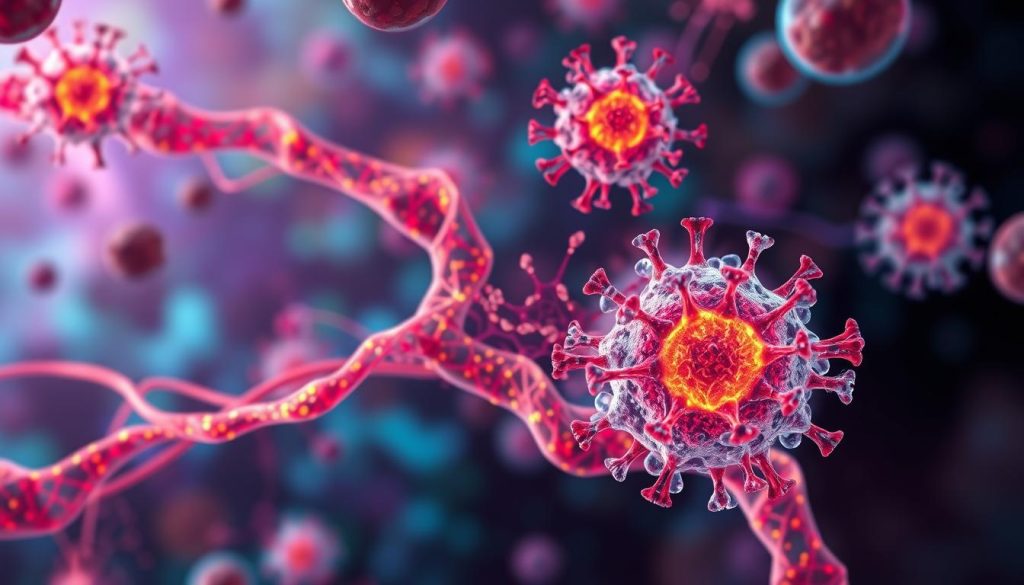
CAR T Cells Expressing Chemokine Receptors
Chemokine receptors help guide T cells to certain areas. By making CAR T cells carry these receptors, researchers want to get T cells to tumors better. They’re looking at receptors like CXCR4, CCR2, and CCR4 to target tumors.
- CXCR4 for targeting CXCL12-expressing tumors
- CCR2 for targeting CCL2-expressing tumors
- CCR4 for targeting CCL17 and CCL22-expressing tumors
With these receptors, CAR T cells might find their way through the tumor better. This could help them reach tumor cells more easily.
Combination Therapies to Enhance T Cell Infiltration
Another way to help T cells get into tumors is by using combination therapies. These therapies aim to weaken the tumor’s defenses. Some ideas include:
| Combination Therapy | Mechanism of Action |
|---|---|
| CAR T cells + checkpoint inhibitors | Blocking immunosuppressive pathways to enhance T cell function |
| CAR T cells + oncolytic viruses | Inducing tumor cell lysis and promoting T cell infiltration |
| CAR T cells + radiotherapy | Modulating the tumor microenvironment to favor T cell infiltration |
“Combination therapies that target multiple aspects of the tumor microenvironment hold great promise for improving CAR T cell therapy in solid tumors.” – Dr. Sarah Johnson, leading CAR T cell researcher
These combination strategies aim to make the tumor environment more welcoming to T cells. This could lead to stronger anti-tumor responses.
Latest Clinical Trials and Results
The field of CAR T cell therapy for solid tumors has made big strides. Many clinical trials are underway to check its safety and effectiveness. Despite challenges, the latest results offer hope for those fighting solid tumors.
One key trial targets the mesothelin antigen in advanced pancreatic cancer. Patients got CAR T cells designed to attack mesothelin on cancer cells. The results were encouraging, with some patients showing partial responses and stable disease.
Another breakthrough is CAR T cells for HER2-positive breast cancer. HER2 is found in aggressive breast cancers. In a trial, patients with HER2-positive breast cancer got CAR T cells targeting HER2. The results were promising, with good safety and responses.
The table below shows some ongoing CAR T cell trials for solid tumors:
| Trial Name | Target Antigen | Tumor Type | Phase |
|---|---|---|---|
| CART-meso | Mesothelin | Pancreatic Cancer | I/II |
| HER2-CAR T | HER2 | Breast Cancer | I |
| GD2-CAR T | GD2 | Neuroblastoma | I/II |
| EGFR-CAR T | EGFR | Glioblastoma | I |
While promising, CAR T cell therapy for solid tumors is just starting. Researchers are working to improve CAR designs and find the best combinations. As more data comes in, CAR T cell therapy’s power to change solid tumor treatment becomes clearer.
CAR T Cell Therapy of Solid Tumors: Case Studies
CAR T cell therapy has been a game-changer for blood cancers. But, it’s been tougher to use it for solid tumors. Yet, new studies show CAR T cells can target solid tumors, giving hope to those with hard-to-treat cancers.
Glioblastoma
Glioblastoma is a fast-growing brain tumor with a bad outlook. A study looked at CAR T therapy for glioblastoma, focusing on the EGFRvIII antigen. A 50-year-old man with glioblastoma got EGFRvIII CAR T cells. He saw his tumors shrink and his quality of life improve.
Pancreatic Cancer
Pancreatic cancer is hard to treat, with few options. A study used CAR T cells targeting mesothelin in pancreatic cancer. A 65-year-old woman with advanced pancreatic cancer got mesothelin CAR T cells. She saw her tumor markers drop and her symptoms improve.
Breast Cancer
Triple-negative breast cancer (TNBC) is aggressive and hard to beat. A study used CAR T cells targeting ROR1 in TNBC. A 45-year-old woman with TNBC got ROR1 CAR T cells. She had a complete response, with no cancer found six months later.
| Solid Tumor | Target Antigen | Patient Outcome |
|---|---|---|
| Glioblastoma | EGFRvIII | Significant tumor reduction, improved quality of life |
| Pancreatic Cancer | Mesothelin | Partial response, decreased tumor markers, improved symptoms |
| Breast Cancer (TNBC) | ROR1 | Complete response, no detectable disease at 6 months |
These studies show CAR T cell therapy’s promise for solid tumors. They lay the groundwork for more research and trials to make this therapy even better.
Personalized CAR T Cell Therapy for Solid Tumors
Personalized cancer treatment is a new hope for fighting solid tumors. It uses individualized CAR T therapy, making treatment fit each patient’s needs. This method creates CAR T cells that target specific tumor antigens, aiming for better results.
The journey starts with studying the patient’s tumor. Scientists sequence the tumor’s genes to find unique targets. Then, they take the patient’s T cells and modify them to carry CAR receptors.
This therapy has many benefits. It can tackle the problem of different tumor cells and escape. It also uses the patient’s own cells, reducing rejection and improving CAR T cell survival.
Many trials are testing this therapy in solid tumors. They try different ways to choose targets and design CARs. The goal is to make the therapy work best for each tumor type. Here are some trials:
| Trial Name | Tumor Type | Target Antigen | Phase |
|---|---|---|---|
| NCT04349241 | Glioblastoma | EGFRvIII | Phase 1 |
| NCT03638206 | Pancreatic Cancer | Mesothelin | Phase 1/2 |
| NCT03356795 | Breast Cancer | HER2 | Phase 1 |
While promising, this therapy faces challenges. Making CAR T cells for each patient is complex and slow. It also costs a lot, making it hard for some to access.
The future of cancer treatment lies in personalized approaches that harness the power of the immune system. Individualized CAR T therapy represents a significant step forward in this direction, promising hope for patients with solid tumors.
As research improves, making this therapy more affordable and accessible is expected. New technologies like single-cell sequencing and artificial intelligence will help make it more precise and effective.
Future Directions and Challenges
Researchers are looking into new ways to make CAR T cell therapy better for solid tumors. Next-generation CAR T cells aim to tackle the tough tumor environment and improve results for patients.
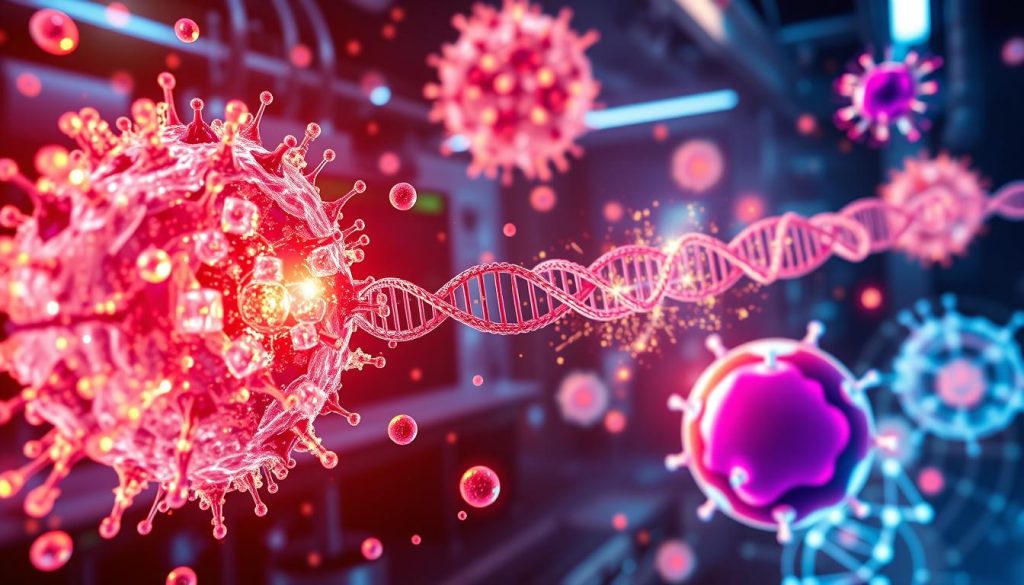
Next-Generation CAR Designs
Scientists are creating advanced CAR designs to fight the tumor’s defenses. These next-generation CAR T cells are designed to work better. They have extra receptors or cytokines to find and kill cancer cells. Some new designs include:
- Armored CAR T cells that release pro-inflammatory cytokines
- Dual-targeted CAR T cells that find multiple tumor markers
- CAR T cells with systems to turn on and off
Allogeneic CAR T Cells
Allogeneic CAR T therapy uses donor T cells, not the patient’s. This “off-the-shelf” method could make treatment faster and cheaper. It could help more patients get the treatment they need.
“Allogeneic CAR T cells have the power to change the game. They offer a ready, standard product for treating solid tumors.”
Combination Therapies
Researchers are also looking into combining CAR T cells with other treatments. Mixing CAR T cell therapy with checkpoint inhibitors, targeted therapies, or radiation could lead to better results. These combos aim to:
- Help T cells get into solid tumors
- Beat the tumor’s defenses
- Stop the tumor from coming back
The future of CAR T cell therapy for solid tumors looks bright. With new CAR designs, allogeneic CAR T cells, and combo therapies, we can unlock its full power. This could lead to better treatments for patients.
Regulatory and Manufacturing Considerations
CAR T cell therapy is making big strides in treating solid tumors. But, there are big hurdles in making these treatments available to patients. CAR T cells need special making processes and strict quality checks to be safe and work well.
One big challenge is that different places and companies make CAR T cells in different ways. It’s important to have the same making steps and quality checks everywhere. The FDA and other groups are working with companies to set rules and best practices for making CAR T cells.
Another big thing is that CAR T cells are made just for each patient. They use the patient’s own immune cells, which are changed to attack cancer. This means making CAR T cells needs careful planning between doctors and makers to get the product to patients fast and right.
To solve these problems, new ways to make CAR T cells are being tried. These include:
- Automating cell steps
- Creating CAR T cells that can be used by anyone
- Improving how cells grow in the lab
As CAR T cell therapy grows, working together is key. This includes regulatory groups, companies, and research places. They must all work together to make sure these treatments are safe and work for patients with solid tumors.
Potential Impact of CAR T Cell Therapy on Solid Tumor Treatment
CAR T cell therapy could change how we treat solid tumors. Researchers are working hard to solve the challenges of using CAR T cells for solid tumors. This new approach is showing great promise.
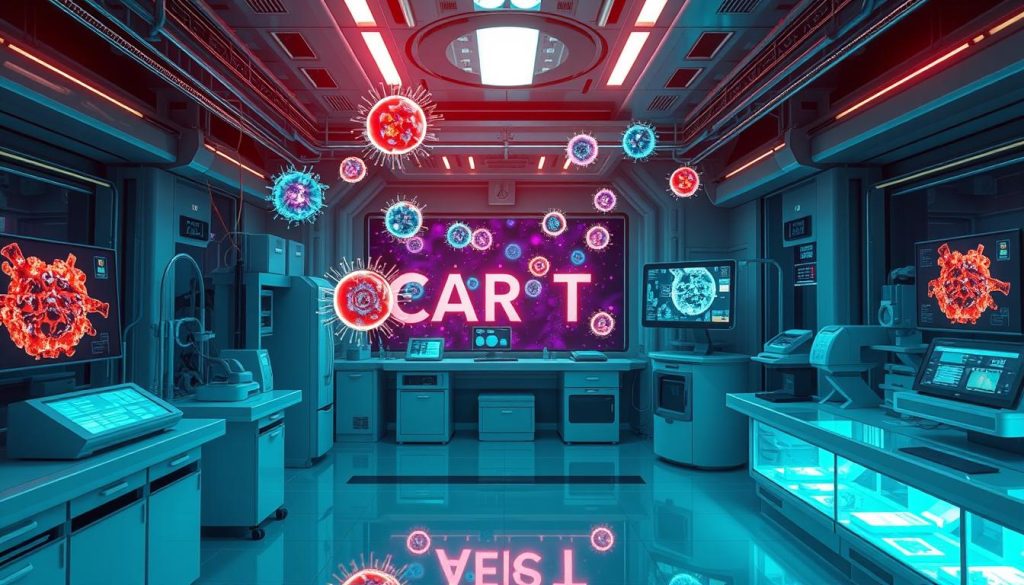
One big advantage of CAR T cell therapy is its targeted, personalized method. T cells are engineered to find and destroy cancer cells. This could make treatment more effective than old methods like chemotherapy or radiation.
Also, CAR T cells can stay in the body and keep fighting cancer for a long time. This could lead to lasting remissions and better survival rates for solid tumor patients.
“The impact of CAR T cell therapy on solid tumors is exciting. As we improve this method, we might offer patients a better, more tailored treatment. This could greatly improve their outcomes and quality of life.”
Clinical trials are exploring CAR T cell therapy for solid tumors like glioblastoma, pancreatic cancer, and breast cancer. The results are promising. If these trials succeed, CAR T cell therapy could become a common treatment for solid tumors. This would change the cancer treatment world.
Conclusion: The Promise of CAR T Cell Therapy for Solid Tumors
CAR T cell therapy has changed the game for blood cancers, giving hope to those who’ve tried everything else. Researchers are now focusing on solid tumors, making the future of cancer treatment look bright. They’re working hard to make CAR T cell therapy work for solid tumors too, bringing hope to more patients.
New ways to use CAR T cell therapy are emerging. These include targeting more than one antigen and making cells better at fighting cancer. Clinical trials are showing promising results, and personalized treatments are getting better. This means CAR T cell therapy could soon be a big help in treating solid tumors.
There are challenges ahead, but scientists are up for the task. Their hard work and creativity give us hope. As we keep exploring what CAR T cell therapy can do, we see a future where it’s a key part of treating solid tumors. The dream of using CAR T cell therapy for solid tumors is becoming a reality, one step at a time.
FAQ
Q: What is CAR T cell therapy, and how does it work?
A: CAR T cell therapy uses your own immune cells to fight cancer. It takes T cells and makes them better at finding and killing cancer cells. This is done by adding a special receptor that helps the T cells target cancer cells.
Q: Why is it challenging to treat solid tumors with CAR T cell therapy?
A: Solid tumors are hard to treat with CAR T cells for several reasons. The cancer cells can change and hide from the immune system. Also, it’s tough for the T cells to get into the tumor. These problems make it hard for CAR T cells to kill the cancer cells effectively.
Q: What strategies are being developed to enhance CAR T cell efficacy in solid tumors?
A: Scientists are working on new ways to make CAR T cells better for solid tumors. They’re trying to make T cells target more than one cancer protein at a time. They’re also working on making T cells more resistant to the tumor’s defenses. And they’re finding ways to help T cells get into the tumor more easily.
Q: Are there any clinical trials currently investigating CAR T cell therapy for solid tumors?
A: Yes, many clinical trials are looking at CAR T cell therapy for solid tumors. These trials are testing different types of CAR T cells in cancers like glioblastoma, pancreatic cancer, and breast cancer. They’re checking if these treatments are safe and effective.
Q: What is personalized CAR T cell therapy, and how could it benefit solid tumor treatment?
A: Personalized CAR T cell therapy is tailored to each patient’s cancer. It makes CAR T cells that target specific proteins on the patient’s cancer cells. This could lead to better results and fewer side effects, as it’s designed for each person’s unique cancer.
Q: What are the future directions and challenges for CAR T cell therapy in solid tumors?
A: The future of CAR T cell therapy for solid tumors looks promising. Scientists are working on new CAR designs and exploring ways to make treatments more effective. But, there are challenges like keeping T cells alive longer and managing side effects. These hurdles need to be overcome to fully benefit from this treatment.












